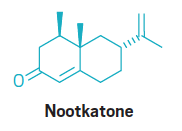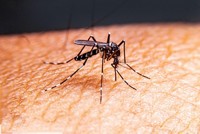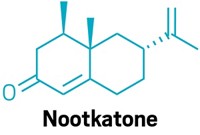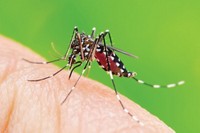Advertisement
Grab your lab coat. Let's get started
Welcome!
Welcome!
Create an account below to get 6 C&EN articles per month, receive newsletters and more - all free.
It seems this is your first time logging in online. Please enter the following information to continue.
As an ACS member you automatically get access to this site. All we need is few more details to create your reading experience.
Not you? Sign in with a different account.
Not you? Sign in with a different account.
ERROR 1
ERROR 1
ERROR 2
ERROR 2
ERROR 2
ERROR 2
ERROR 2
Password and Confirm password must match.
If you have an ACS member number, please enter it here so we can link this account to your membership. (optional)
ERROR 2
ACS values your privacy. By submitting your information, you are gaining access to C&EN and subscribing to our weekly newsletter. We use the information you provide to make your reading experience better, and we will never sell your data to third party members.
Biological Chemistry
Nootkatone tested as a mosquito repellent
Synthetic biology firm to work with CDC on terpene that may help control Zika
by Melody M. Bomgardner
March 30, 2016
| A version of this story appeared in
Volume 94, Issue 14

Nootkatone, a grapefruit-scented terpene, may become a new addition to the small arsenal of mosquito-control tools that could help stop the spread of the Zika virus, according to Evolva, a Swiss biotechnology firm.
A common flavor and fragrance molecule, nootkatone can be extracted from grapefruit skins or the bark of the Alaska yellow cedar. But it is a popular target molecule of synthetic biology firms working to scale-up less-expensive fermentation production routes.
In 2014, Evolva acquired Allylix, a start-up that developed an early process to make nootkatone via sugar fermentation. At the time, Allylix was promoting the potential use of nootkatone to prevent the spread of ticks that carry Lyme disease.
Now, Evolva says it is working with the U.S. Centers for Disease Control & Prevention to research nootkatone’s ability to repel and kill mosquitoes including the species Aedes aegypti, which can carry Zika and yellow fever. Evolva is also conducting studies required by the Environmental Protection Agency to get nootkatone approved for use as an insect repellent.

Plant terpenes such as citronella and geraniol have long been known to repel mosquitoes; indeed, plants produce the chemicals to deter insect predation. Another synthetic biology firm, Amyris, disclosed last month that it is developing an unnamed mosquito-control chemical. Amyris derives flavor and fragrance molecules from farnesene, a fermentation-produced terpene.
CDC researchers have shown that nootkatone can kill adult mosquitoes as well as ticks and fleas. And one CDC study suggests that its mode of action is different from those of synthetic pesticides (J. Med. Entomol., 2010, DOI: dx.doi.org/10.1603/ME10098). Killing off mosquito populations is becoming increasingly difficult as they develop resistance to traditional permethrin, organophosphate, carbamate, and dieldrin insecticides, according to the CDC.
The World Health Organization advises that controlling the spread of Zika requires removing mosquito breeding sites and reducing contact between mosquitoes and people, such as by wearing insect repellent.
“Well-implemented mosquito control can effectively reduce the transmission of mosquito-borne viruses, including Zika,” WHO officials stated in a February report. “However, mosquito control is complex, costly, and blunted by the spread of insecticide resistance.”





Join the conversation
Contact the reporter
Submit a Letter to the Editor for publication
Engage with us on Twitter